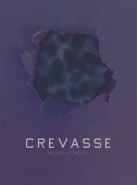
Book Review: Crevasse by Nicholas Wong

Crevasse
Poems by Nicholas Wong
Kaya Press, April 2015
ISBN-13: 978-1885030207
$15.95; 76pp.
Reviewed by Maggie Trapp
Crevasse is a gathering of poems that startle in the insistent way they play with memory, history, form, and the expectations we as readers bring to poems. These lines are invested in sentiment as well as intellect. Readers are invited to both feel and think in ways that create a dis-ease, in ways that push against expectations, in ways that challenge comfort. Wong writes in a seemingly causal, confessional, even glib voice about experiences and memories that discomfit us. The assistant poetry editor for Drunken Boat, Wong writes of bodies and antibodies, of Hong Kong and the Queen of England, of sexual awakenings, of race, of desire, of what we might see and know through the body, of politics as well as the erotic, of mourning and loss.
This is a slender volume that seems modest, even spare. But as we read we quickly realize that Wong’s verse, though subtle, is charged with transgression, concerned with trespass, and interested as much in the unsaid as in the said.
In these poems, Wong plumbs the crevices made in assumptions about race, memory, sexuality, even form. Lines push against formal norms, they scatter as well as contain thought. Lines enjamb and spill over with sentiment and meaning. Stanzas break apart across pages, or they appear tidy and decorous only to offer disjointed, unsettling lyric moments.
Wong takes hard truths and rewrites them, suggesting that the reader view race and identity and colonialism anew. In “Postcolonial Zoology: 1997, Hong Kong,” he presents a wry taxonomy of both the indignities and the opportunities ushered in with the handover of Hong Kong from the United Kingdom to the People’s Republic of China:
It is not the pedigreed corgis they left
at the handover, but the effigy of the Queen
on toothed stamps being self-important
in dusted albums. We bolted to banks to trade
for new coins. We went to the West, away
from communist coxswains, but were whittled
to sculptures called “second-tier citizens,”
second to terriers. Our being could start
a chapter in zoology: we are inedible
bilingual centaurs spreading swine flu
at the turn of the century…
As in all of Crevasse, here Wong makes light of while also asking the reader to consider seriously the pathos as well as the bathos of the current human predicament. Wong disturbs stereotypes and deranges expectations, all to disquieting effect. Here, the people of Hong Kong are not one thing or another; they are “bilingual centaurs” who fall into no expected binomial nomenclature—part history, part myth, a new zoological category. Their British past is squared away in self-important stamp collections, where the colonizers’ only teeth are now the ones on stamps interred in albums. And yet, the Chinese present renders those in Hong Kong “second-tier citizens,” more lowly even than dogs. The reader comes away from Wong’s poems moved, altered, with ideas about memory, attachment, home, and race reset.
In “Aqua,” Wong offers scant, barely there lines that convey all that cannot be conveyed following a huge natural disaster, in this case an earthquake:
After the quake
a crevasse —
what leaks into the air
like a moth
maniacal about
light
•
A clock’s hand ticks
to hate the grid
between two
minutes, a frigid
distance of shook
and shock
•
Sacrilege — the land
is an embryo
outside a uterus
Survivors think
of the missing,
then the shape
of the missing
•
Let nature be
the new linguist —
Loss now
a count noun,
concrete
like beans
•
We, thinly
languaged, catalog
catastrophes,
a dozen disembodied
heads, one
for each month
Wong manages to take the measure of things that defy easy categorization. Nature takes on the role of linguist after the disaster, where loss, like beans, is now parsed as a count noun. “Aqua” is a poem of unnerving simplicity, one where mourners tally lost loved ones just as an accountant might keep a budget by counting beans. This understated grief is almost absurd in its plainness, and in this way readers come to feel its magnitude. Loss becomes its own calculus, a devastating reckoning that defies our “thinly languaged” attempts at articulation.
These poems are cut on the bias. Lines go against expectation, surprising us with their mingling of high and low, the political and the personal, the quiet as well as the unseemly. Reading Crevasse will leave readers discomposed yet restored.
Maggie Trapp teaches literature and writing for UC Berkeley Extension. She writes book reviews for various publications.
